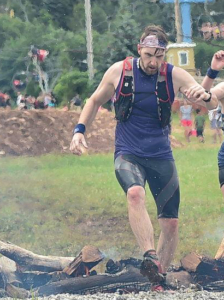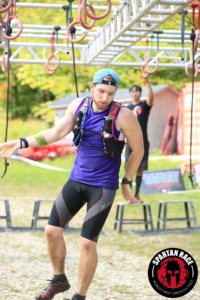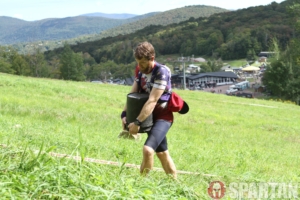DNF. One of racing’s “bad words.” A phrase that strikes fear into most racers and brings up bad memories for grizzled veterans. I wanted to talk about DNF-ing and knowing when to take yourself out of a race.
This is a topic that is very personal to me and I would like to talk about the dangerous situations I have put myself in just to finish a race and get a medal. I know this could be a controversial topic in the OCR community. The majority of us believe we are “Real Spartans” who need to go hard and die with a sword in our hand rather than to give up. I am hoping that by telling my stories, other racers out there who may feel a bit of social pressure to finish races can see that DNF-ing is not as bad as it seems.
The early years
In my seven years of running OCRs, I have blacked out during a race three times. Each time has been a little bit different, but they each time it got worse and I put myself in more danger.
The first time this happened, I figured it was just a weird, one-off occurrence. My  sight went out for a few seconds and I was back on my feet. I went on to finish the 2014 Virginia Super.
sight went out for a few seconds and I was back on my feet. I went on to finish the 2014 Virginia Super.
The second time was at the 2017 Pennsylvania Super. I was fully aware of how much danger I was in. Mistake #1: I didn’t run the race with water. Mistake #2: Three days before the race, I had been bitten by a lone star tick and had the trots. Mistake #3: I kept going because I wanted to get a Trifecta for that year.
I finished the race, but I experienced a new level of blackout. I failed the twister and during my burpees, I blacked out and mentally came to when I jumped into the dunk wall water. You read that right, everything went black but my body kept going. I soldiered on like everything was fine., but have no memory of finishing my burpees and running to the next obstacle. I ignored a lot of my early warning signs just to get a medal.
Learning from my mistakes
I have attempted the Killington Ultra Beast three times. I DNF’d in 2016 and 2017. In 2017, I experienced my final blackout. By the time I finished my first lap, I had eaten everything I had on me and refilled my water almost every aid station, but was still out of water as I got to Olympus. I failed, and around burpee 14 or 15, my sight just went out.  Complete darkness. I coulf feel the grass in my hands, my chest heaving against the ground. I could hear the muffled thumps of the festival music. Then the music became clearer. I could see a faint red glow and the dark tunnel slowly crept away and I could see again. It felt like minutes but in reality, it was just a few seconds. I settled myself and then continued doing my burpees. I got into the pit, fell down and passed out from exhaustion as I tried to open my bucket.
Complete darkness. I coulf feel the grass in my hands, my chest heaving against the ground. I could hear the muffled thumps of the festival music. Then the music became clearer. I could see a faint red glow and the dark tunnel slowly crept away and I could see again. It felt like minutes but in reality, it was just a few seconds. I settled myself and then continued doing my burpees. I got into the pit, fell down and passed out from exhaustion as I tried to open my bucket.
I struggled with the idea of DNF-ing because I felt like I was letting down my family, friends, and followers on instagram. I put the weight of that on myself and felt a bit of shame. My friends at the race told me it was the best decision. While I worked hard for the event, it just didn’t work out, and I didn’t need to make it worse for myself. They were right. I knew something was very wrong and if I went back out on course things could have ended up much worse. So I ate some food, drank all the water Killington had and signed up to try again in 2018.
Repeating the same mistakes
In 2018, I finished the Killington Ultra Beast and it was a massive weight lifted off my shoulders. I shook a demon that had been haunting me for three years, but I didn’t come out unscathed. My success came with the longest lasting issues I have ever experienced from being dehydrated.
I will cut right to the chase: I was dripping sweat throughout the whole race, so much so that I had to change shirts at the drop bucket. I consistently drank water, but it still wasn’t enough. It was after the bonus loop that I knew I was in trouble. I knew I needed water, but I didn’t realize how badly until my face stopped sweating. What does that have to do with anything? Isn’t that a good sign? It actually isn’t, it is a very bad sign. According to Lawrence E. Armstrong, PH.D:
This is the body trying to regulate; we don't have enough fluid to both sweat and pump blood to the muscles, so it starts selectively shutting down some processes… That's the body saying, ‘I need that fluid elsewhere,' so it shuts off the blood vessels in the face.
According to my own doctor, I had very little fluid going to my head, which means I didn’t really have fluid going to my brain. Luckily there was a water station coming up, but the damage had been done at that point. I spent about 15 to 20 minutes filling up on water and contemplating if I should quit. I was well ahead of the cut off time and on pace to finish, but I knew something was wrong. I was nearing severe dehydration. I kept going, though, and made it to the finish line.
Why did I keep going? The year before I was in the same kind of trouble and I decided to not put myself in further danger, so why did I do it again? I did it because I wanted the race to be over, I wanted it to end. Year after year of training for the Vermont Ultra was becoming a drag. I had bought an Ultra Beast hoodie that I wouldn't wear or take out of the packaging because I hadn't earned it yet, I wanted to finally wear that hoodie. Most importantly I wanted to wear that medal around my neck. My intentions were for glory and not for my own safety.
Dealing with the consequences
When I crossed the finish line, hugged my friend who supported me, got the medal put around my neck and the adrenaline and emotions wore off, I felt the damage almost immediately. My muscles were already stiff. My face was tight from being dried out and burned when I splashed water on it. I could feel and hear my heart beat in my head and certain moments felt like they were in slow motion. The danger sign was when I went to the bathroom and the toilet resembled the color of watered-down Tang. I got as much Nuun and water I could handle into my system over the next few hours. The real problems started the next day when I realized I didn't have much to talk about or pay attention to, my brain was just checked out.
The weeks after the race, I experienced short-term memory loss. I would start sentences and completely forget what I was talking about. I would call people and not remember who or why I was calling. I would start talking to someone and forget what I was even talking about just a few words into the sentence. I would be mid-conversation with people and walk away as if the conversation was actually over. It is hard to describe how it felt in those weeks because a lot of people just think that I was forgetful or distracted. I hid these problems from my family, friends, and co-workers because I didn’t want it to be a big deal. There were times I tried not to cry because I was so frustrated with myself for not  being able to function properly in day-to-day life. The worst part was that I did this all for a shiny piece of metal that I have sitting on a shelf collecting dust.
being able to function properly in day-to-day life. The worst part was that I did this all for a shiny piece of metal that I have sitting on a shelf collecting dust.
As of today, I still experience these problems; luckily they are not as frequent as they were. If I could go back to that race in 2018 and find myself in the transition pit, I would stop myself from going back out on that second loop because it wasn’t worth it. I would much rather live life as a fully functioning human being than have that medal.
What's the point of this long story?
Running these races I have heard this type of phrase from several different racers:
“I would rather be pulled off of this course on a stretcher than quit.”
Is this the mindset we want in OCR? To me, this isn’t what I want people to think when they are out on the course. I want racers to know that it is okay to quit. There is no shame in bowing out when you know that you are in over your head or something just doesn’t feel right in your body. The reward of finishing these races does not equal the damage you can do to your body by pushing through your pain or ignoring the signs your body is giving you.
I know this isn’t a common topic in the OCR community, but I know from my personal experience and from my friends who have made the same mistakes that it is something that needs to be talked about more. By sharing our experiences together, we can learn from each other. Especially as Ultra distance races grow in popularity, racers need to understand that sometimes you won’t get it on your first try. Sometimes your body just won’t have it that day. There is no shame in tapping out. Most racers will sympathize with you, share their stories, and they will encourage you. The crazy thing is, most will also congratulate you for getting as far as you got. That is the true culture of OCR.
This article was originally supposed to be an article about spotting the signs of dehydration, but it morphed into sharing my experiences racing and problems I have encountered on and off the course. I hope other racers who have struggled with the idea of DNF-ing can relate to this article and find it helpful in some way. The main thing I want to leave you all with is this: there is a difference between pushing through a difficult time and realizing you had more in you than you thought, and finding your physical limit.
Disclaimer: The viewpoints expressed by the authors do not necessarily reflect the opinions, viewpoints and official policies of Mud Run Guide LLC, or their staff. The comments posted on this Website are solely the opinions of the posters.


Hardest thing I ever did was to walk off New Jersey Spartan ultra mile 26 of 30. I was suffering from pinched nerve in my lower back forcing myself to continue. the course looped back towards the start-finish line I pulled up and did the Walk of shame.
A few visits to the chiropractor and everything was back to normal and I set my fastest time the following year for the ultra. I don’t make money racing, and still getting a dnf was one of the hardest things but I’ve ever done. 5 Ultras later including Iceland looking for two more this year. Lick your wounds and live to fight again very important in survival!